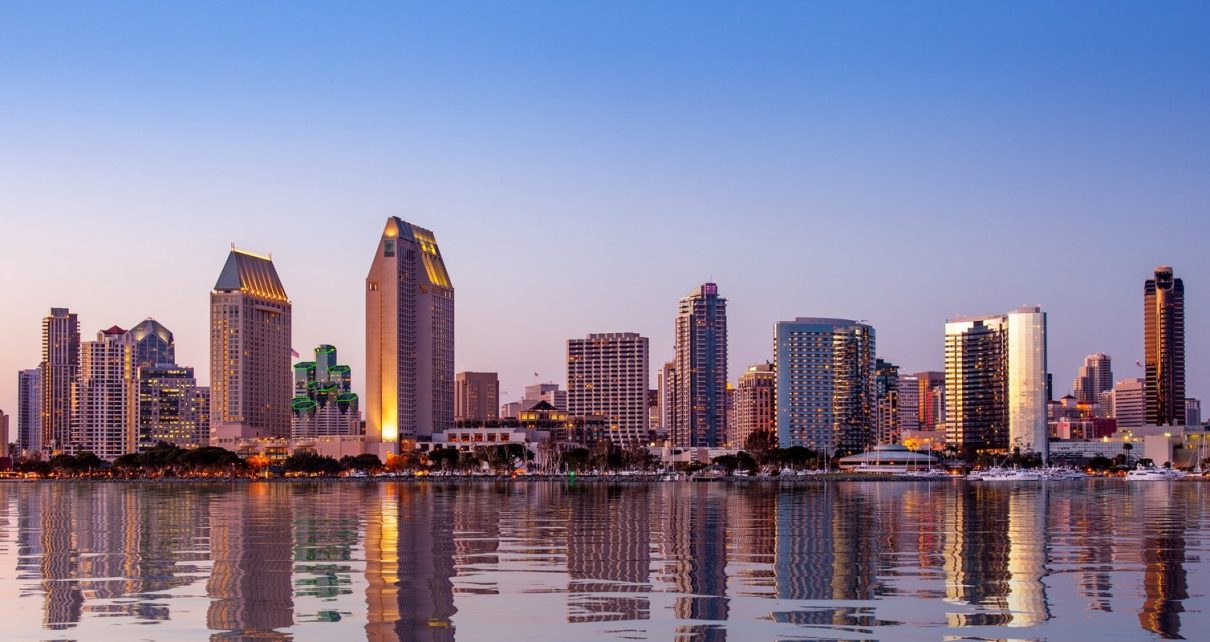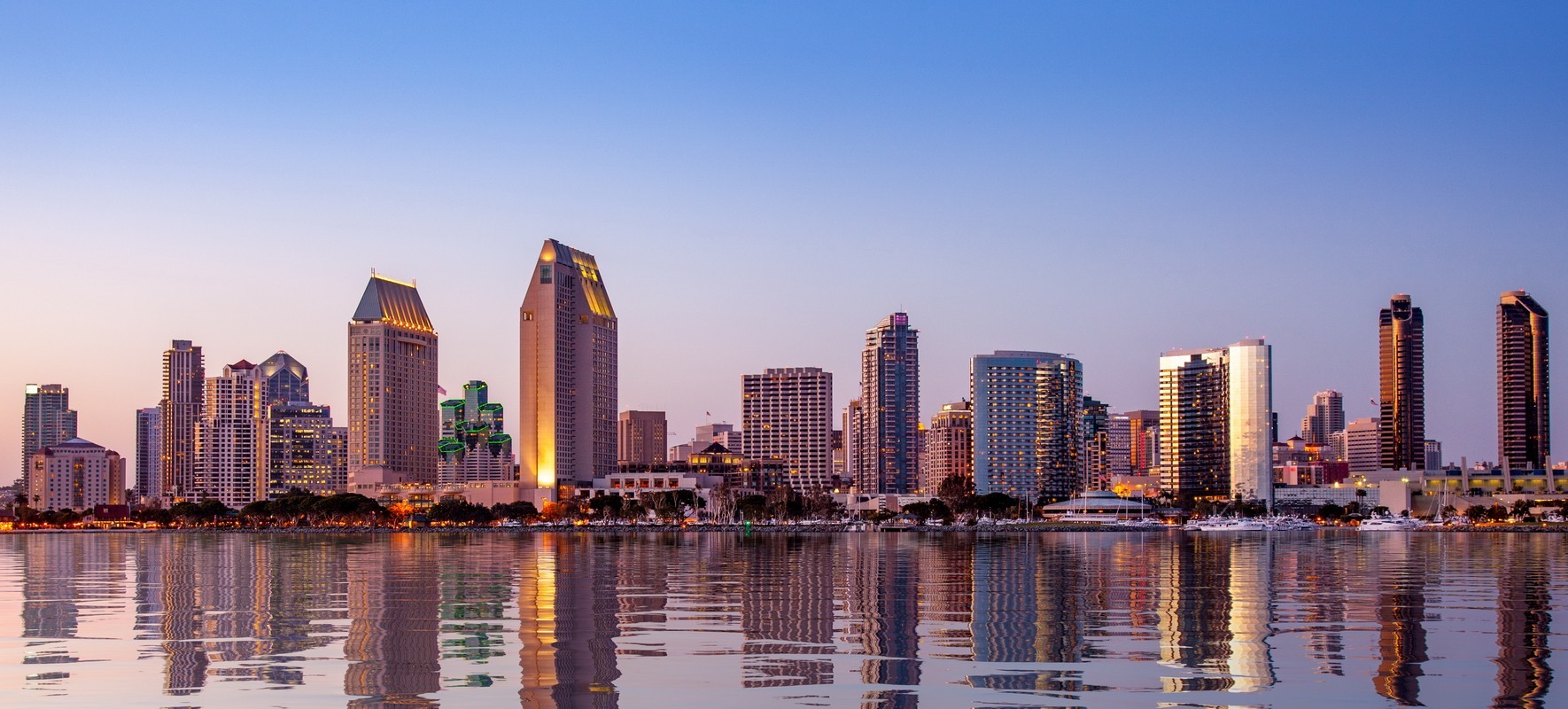
Downtown San Diego. (Photo: City of San Diego website)
San Diego City Council Passes Landmark Ban on Street Vendors
New ordinance could influence other Southern California cities facing similar street vendor issues
By Evan Symon, March 2, 2022 3:45 pm
The San Diego City Council passed an ordinance in an 8-1 decision on Tuesday that will severely regulate street vendors across the city, either outright banning vendors from locations, or instituting seasonal moratoriums in high traffic and tourist locations.
An increasing number of pushcart vendors and those setting up shop for part of the day in high-traffic areas have long been an issue in the city, with many businesses complaining of unfair competition, such as food vendors setting up outside of restaurants, and illegal dumping by vendors. Tourism has also been affected, with many tourists complaining of the vendors being in overcrowded areas and negatively affecting their experience.
After several years of languishing in discussion, as well as being delayed due to the COVID-19 pandemic, the City Council finally passed a major crackdown on where street vendors can operate.
Beginning June 1st, tourist and pedestrian-heavy areas such as the Gaslamp Quarter, Little Italy, and Old Town will face a ban on vendors. Vendors will no longer be able to operate on the main thoroughfares in those districts and instead have to operate on cross streets, side streets and generally far away from areas with many small businesses or places with heavy bike traffic like bike paths.
Summer bans from Memorial Day to Labor Day against street vendors will also take place in many beach areas, boardwalks, and around the Convention Center, including Mission Beach, Pacific Beach, Mission Bay, Ocean Beach, and many associated parks including Balboa Park. All displaced vendors would either need to relocate to areas still authorized for vendors or can go to newly created “entrepreneurship zones” created by the ordinance, where vendors will be able to gather un-harassed.
Finally, the new ordinance added more regulation, forcing all vendors to get a business license and vendor permit to operate at high-traffic areas, including the seasonally banned areas outlined in the ordinance. Prohibited items to sell were also clarified in the ordinance, with vendors being unable to sell, alcoholic beverages, cannabis, tobacco, vaping products, weapons, prescription drugs, and live animals. Should a vendor break any of these new laws, they will face fines and possible impoundment of their vending equipment and vehicles.
Reaction to ordinance mostly positive
While some business owners, lawmakers and other San Diegans had hoped for more for more areas free of street vendors, less broader wording to help with police crackdowns, and more requirements like having insurance, most approved of the new law, noting that San Diego would begin looking like San Diego again.
“I fully understand that not everyone is happy with the ordinance and there is still work to do, but I’m confident this is the compromise that will get regulations on our books to increase public health and safety, while also promoting entrepreneurship among our residents,” explained Councilman Raul Campillo on Tuesday.
San Diego restaurant owner Amy Little added in a Globe interview on Wednesday, “they have taken so much of our foot traffic business away from us. They are literally making food right outside our doors and stopping potential customers from coming near us by selling to them first. It was amazingly unfair. The sooner they are gone the better for everyone. I feel for them because many are immigrants trying to make a living, but they are doing it in a way that puts so many more at a disadvantage, or simply scares people away. This ordinance really helps us out.”
However, vendors said that the new ordinance is way too restricting, effectively cutting them off from the most profitable areas, and that since it targeted a business type that is almost exclusively Latino, it was also targeting them based on race.
“The ordinance as written is restrictive and will make it very difficult for sidewalk vendors to continue to operate,” said San Diego Immigrant Rights Consortium leader Erin Tsurumoto Grassi. “It bans sidewalk vendors from operating in some of the most high-traffic, profitable areas for them and will significantly limit how many vendors can sell in a given area due to restrictions on proximity to other vendors.”
Some also said on Wednesday that San Diego’s law could influence many other cities in Southern California that are currently facing similar vendor problems.
“Walk around on a street, and you are likely to pass a fruit pushcart or someone making tacos at a makeshift stall or something like that.” said Hector Lugo, a former vendor tracker for a University program, to the Globe on Wednesday. “A law like this in some parts of LA or any other biggish city and you could decimate the local immigrant vendors. Some parts of LA, they fill sidewalks and alleys. With this in place, it would just be erased away, or at least largely displaced. With the new camping ordinances coming up, sidewalks might actually be clear in LA again with a permanent ordinance. And with San Diego, there is now big-city precedent.”
- Bill to Require Law Enforcement Disclosure if AI Was Used To Help Write Reports - August 7, 2025
- Gov. Newsom Files FOIA Request To ‘Expose True Cost’ Of L.A. Federal Troop Deployment for Anti-ICE Riots - August 6, 2025
- California Redistricting: How Newsom’s Plan Will Demolish Hard Fought GOP Gains - August 6, 2025




Just like in Tijuana, San Diego beaches and elsewhere have been overrun with Mexicans pushing taco carts and anything else they can sell while ringing little bells. Who knows what’s in the food- giardia, listeria, hepatitis? I’m not usually for bans but this one makes sense.
Have you encountered these vendors, Gnat? Many are white and black too, not just latino.
What about drugs?
“…They are literally making food right outside our doors and stopping potential customers from coming near us by selling to them first. It was amazingly unfair. The sooner they are gone the better for everyone…”
Well, except for the vendors.
i highly highly doubt that. unless you sell food out of walmart
Now All the unemployed immigrant vendors can access Rep Eduardo Garcia’s introduced Bill AB-2847 Unemployment Excluded Worker Pilot Program. A $690, 000, 000 to noncitizens or nationals of the US in CA. We can once again thank the CA Democratic majority government for taking care of small businesses in CA if bill is passed.
The CA Democratic majority government allowed the vendors in the first place. Thanks Brown! (not)
Perhaps I don’t have all the facts, but I strongly suspect street vendors are already required to have a permit and pay an exorbitant fee to the city. If so, why what’s all the commotion about? Just enforce existing laws and remove the unpermitted vendors. Can anyone shed light on this?
Why are restaurants required to pass the Dept of Health inspections but these vendors are not? I am all for entrepreneurs and the little guy, but the playing field must be fair. Pulling the race card is really low. There are many restaurants following the rules run by many different ethnicities. Any city who expects businesses to pay taxes, get permits, and follow health guidelines should never allow these vendors to disregard them.